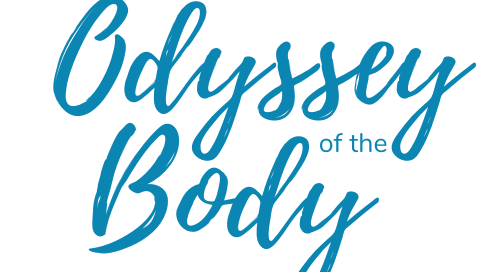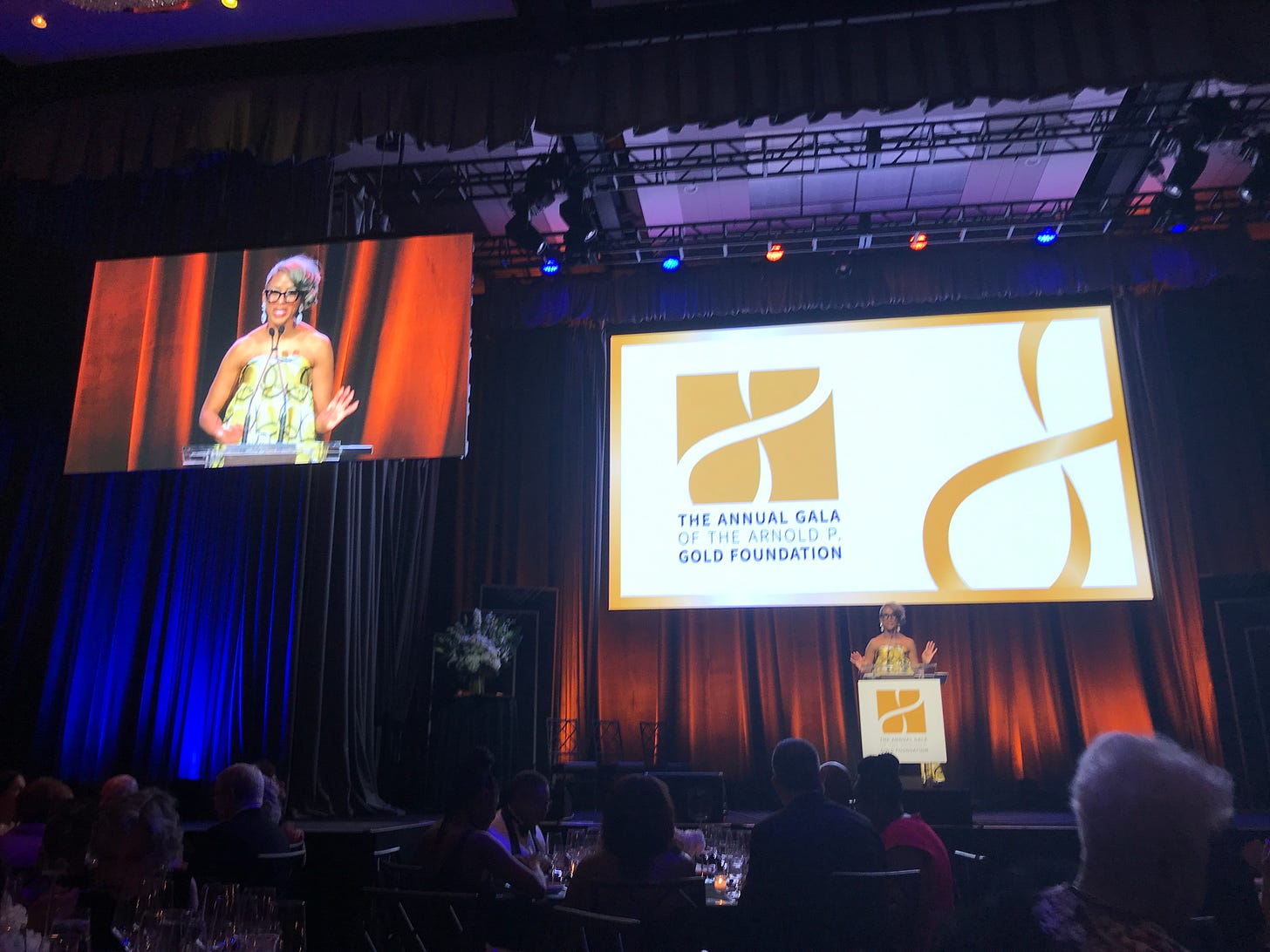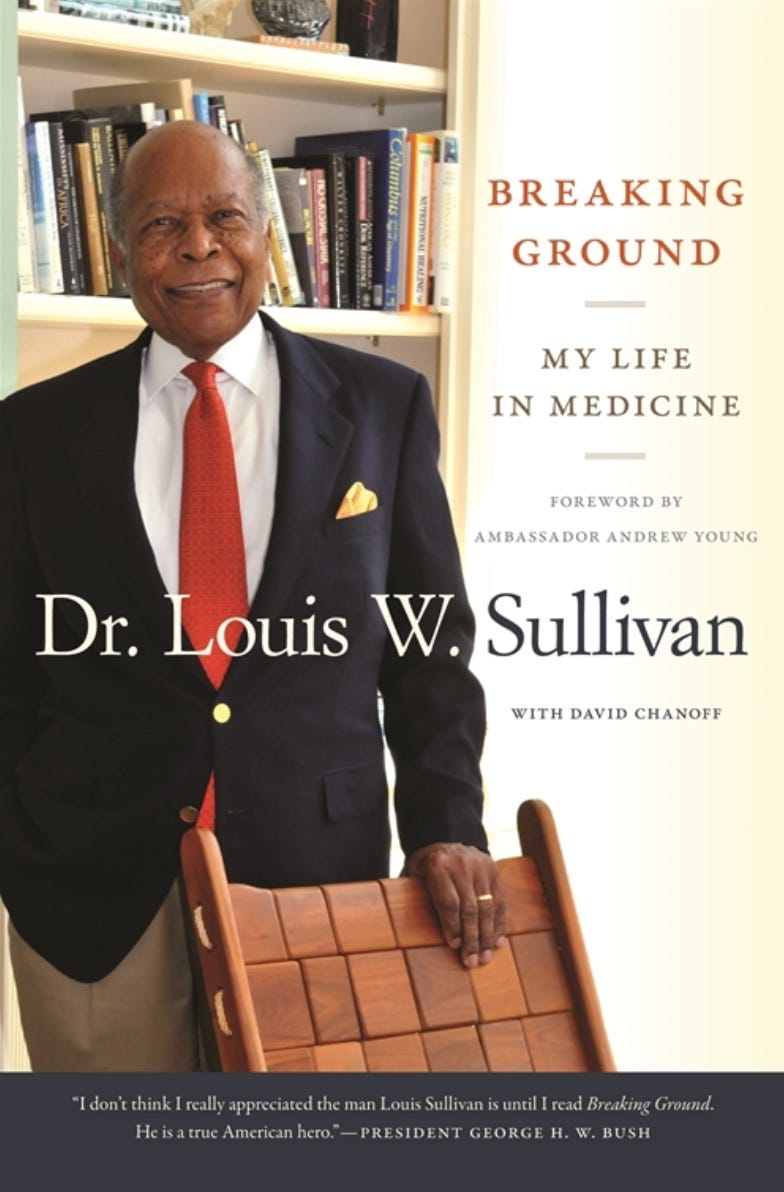🛀 Field Notes: tick-nixing baths, emotions affect learning, AC1 diabetes test may not work well for Asians, & more
Our highest level emotions, like awe, are also wired into our survival mechanisms
Hello, dear friends!
Whew! I am feeling relieved and happy this week, as we pulled off our Annual Gala at my work. It’s the biggest fundraiser of the year for the Gold Foundation, a nonprofit that champions humanism in healthcare for all. The event truly feels like a joyful family reunion and offers an inspiring reminder that lots of people are diligently working on making the world better and do care about their fellow humans. You should come next year! 💛 (Side note: This newsletter is my own project separate from the Gold Foundation, where I work, though I do sometimes share interesting things happening there.)
On to this this week’s Field Notes! Here are 6 interesting items I’ve run across lately …
I recently interviewed one of the gala honorees: Dr. Louis W. Sullivan, an icon in American healthcare who is President Emeritus of Morehouse School of Medicine and former Secretary of the U.S. Department of Health and Human Services. In preparing to write a profile of him, I read his terrific memoir, Breaking Ground: My Life in Medicine.
Dr. Sullivan was born in 1933 during the Great Depression. His memoir is packed with stories, from his childhood in segregated rural Georgia to his years in President George H.W. Bush’s Cabinet. In just one small example of his lasting impact, Dr. Sullivan changed U.S. food labels so they show the percentage of recommended daily allowance of nutrients, not just the amount with no context. He also drew up a plan for expanded healthcare coverage in 1991-1992, long before Obamacare, but with a Democratic-controlled Congress and a Republican administration, it didn’t go anywhere. Really disappointing to learn that! He spoke in his acceptance speech about the need for integrity in healthcare and in our nation. Read profiles of the four Gold Gala honorees here: the Honorable Dr. Louis W. Sullivan, Dr. Gina Spivey-Brown, Dr. Eileen Sullivan-Marx, and Dr. Richard I. Levin.
Sun's out, ticks out. Lyme disease-carrying bloodsucker season is getting longer (NPR) — It is tick season here, and we are constantly looking for these teeny black spots on our skin. “One of the things that [researchers] have found that really reduces your risk of tick-borne illness is to bathe or shower as soon as possible after going indoors” — ideally within two hours, said Melissa Prusinski, a research scientist and laboratory supervisor at the New York State Department of Health. The water both helps unattached ticks to wash off and helps you see your body and be more likely to spot them. Good to know!
Picking the 'right' sunscreen isn't as important as avoiding these 6 mistakes (NPR’s Morning Edition) — Among the helpful tips, I learned that SPF30 blocks 97% of rays and is perfectly good coverage; higher numbers don’t provide that much more and no sunscreen blocks 100% of rays. Also, heat degrades sunscreen, so don’t store a bottle in your car.
“Dr. Immordino-Yang: How Emotions & Social Factors Impact Learning” (Huberman Lab podcast) — In this fascinating podcast conversation, Dr. Andrew Huberman interviews Mary Helen Immordino-Yang, EdD, professor of education and psychology at the University of Southern California and director of the Center for Affective Neuroscience, Development, Learning and Education. They explore our emotions, the impact emotions have on our bodies, how the education system doesn’t typically take this impact into account, and much more. At the beginning, Dr. Huberman asks about what’s happening in our body when we feel awe. Dr. Immordino-Yang explains: “Our most high level, complex brain states, mind states are also fundamentally hooking themselves into themselves in the most basic biological machinery, that literally we share with alligators, that keeps us alive. That is both the power and the potential of being a human, and the danger of it.” Basically our narrative, our stories, our interpretations of the world that inspire us and allow us to make meaning is deeply connected to our very basic survival mechanisms. There is so much here that I need to listen to it again!
The Trauma of Medical Mistreatment: The Reality of Healthcare Injustice (From Streets to Scholarship by Terence Lester newsletter) — Author Dr. Terence Lester was in a terrible car accident a year ago. In this piece, he reflects on the mistreatment he experienced at a public hospital in Atlanta: “What hurt the most was hearing the screams of others who were being neglected and feeling that neglect…. Throughout my time at the hospital, I couldn't help but think about the injustice in the healthcare industry toward impoverished people who need quality care and compassion.” A chilling essay that reminds me how far we still need to go to have humanistic care for all.
For Asian Americans, preventing diabetes may start with earlier screenings (NPR) — The simplest test for diabetes measures A1C in your blood, and current medical guidelines define diabetes as a level of 6.5% or higher. But that marker originated from studies in people mainly of European descent. Research by Dr. Maria Rosario Araneta, an epidemiologist at UC San Diego and a Filipana, showed that the standard A1C test missed half the Native Hawaiians who were diagnosed with Type 2 diabetes through the “gold standard” test (“a comparative blood draw that involves fasting and drinking a sugary drink to see how the body responds”), and the A1C test missed two-thirds of Japanese Americans with diabetes! That gap means diabetes could potentially progress undetected for years, until complications with their eyes or kidneys arise, Dr. Araneta said. To catch these missed cases, she and other researchers recommend Asians who have A1C levels in the range of 5.7% to 6.4% from the standard test get further testing. (To be sure, more research needs to be done on people from different regions in Asia, which is too huge and varied an area and population to be summed up in one group.)
I hope you found something useful here, and I hope you have a sweet weekend ahead!
To our journeys,
Brianne






